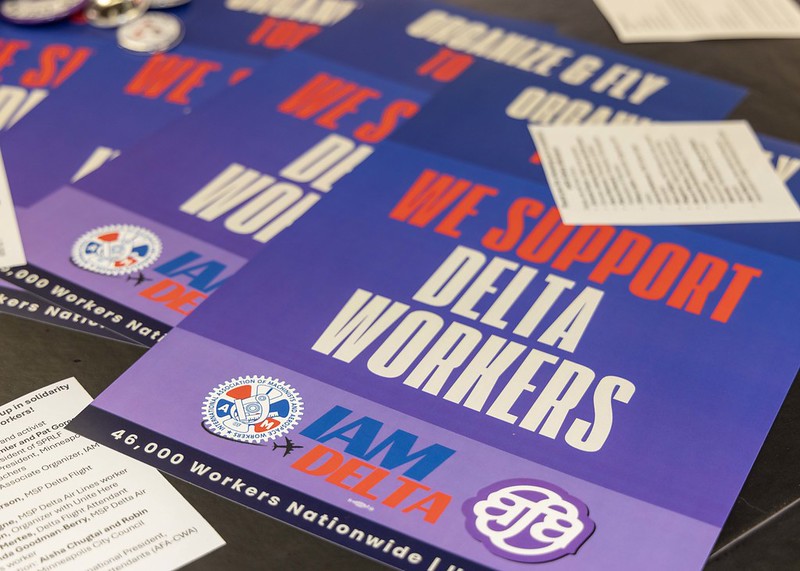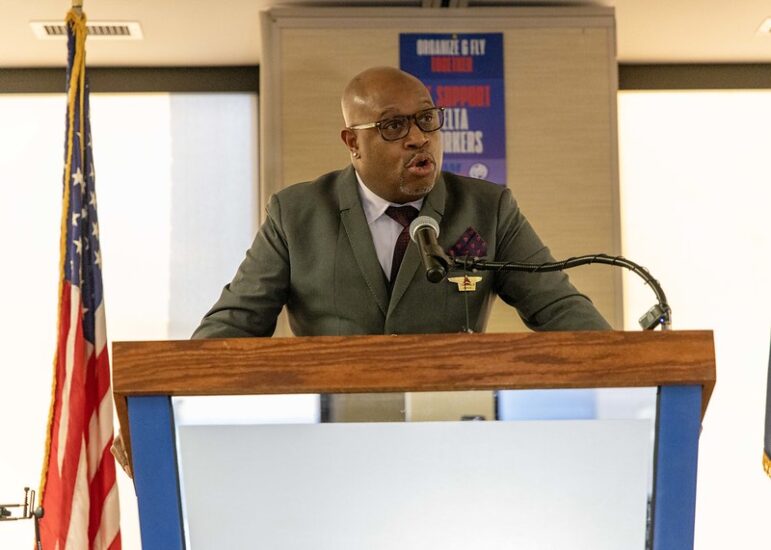
The largest private-sector union drive is taking place at Delta Air Lines with almost 50,000 workers. Photo by Bill Harkum, IAM Communications Representative.

Share
On January 29, a passenger plane, American Eagle Flight No. 5342, and a military Black Hawk helicopter collided midair before crashing into the Potomac River near Washington D.C.’s Reagan National Airport, leaving no survivors. Of the 67 victims, two flight attendants lost their lives, Ian Epstein and Danasia Elder.
Aircraft accidents, software outages, and a global pandemic are just some of the events that airline workers have been on the front lines for in recent years. Daily working conditions are also impacting them and their families. They say the movement to fully unionize the industry with a push to organize at Delta Air Lines is closer than ever.
“We’ve had the opportunity of the last 13 years of working together under the same conditions, and a lot of the newer flight attendants are starting to see the value that a union can bring,” says Jarrod Anderson, a member of the Delta Association of Flight Attendants-Communications Workers of America (AFA-CWA) organizing committee who has worked as a flight attendant for almost 30 years. He worked previously for Northwest Airlines as a unionized employee represented by AFA before the company completed a merger with Delta in 2010, when workers lost union representation in an election.
On Saturday, January 25, around 300 community members rallied in St. Paul, Minn., in support of flight attendants, ramp, cargo, and tower agents who work for the most profitable airline company on the planet. They are organizing what is currently the largest private-sector union drive coordinated between AFA-CWA, the International Association of Machinists and Aerospace Workers (IAM), and the International Brotherhood of Teamsters. Around 28,000 flight attendants and 20,000 ramp, cargo, and tower agents would be able to vote for union representation.
“Do you feel respected by Delta?” said Rob LaVigne, who has been a Delta Air Lines worker for 14 years, to an energized crowd of community members and labor organizers. “When you and your crew landed a plane in a lightning storm and you watched your plane get struck by lightning … something could have happened to us, and we did something wrong? Respect is not fearing that you’re going to lose your full-time schedule every six months because the company wants to make 4.7 billion dollars and they come to the ramp to make cuts first.”
Colleen Schwartz is an AFA organizing committee member who made the switch to Delta from a previous carrier that was unionized because she wanted the opportunity to fly more international trips. “Both my kids are disabled, and that unionized healthcare was a really hard thing to leave behind,” she says. “It didn’t change contract to contract. Delta keeps changing it.”
Although Delta offered boarding pay, flight attendants say they don’t get paid during delays or for “sits” between flights. “Our boarding pay is so sad, it’s like half of our regular pay for half of the time that we’re boarding,” says Schwartz. “It’s almost a joke.”
According to the AFL-CIO, in 2023 Delta CEO Ed Bastian received a salary 336 times higher than the median employee’s pay.
AFA-CWA International President Sara Nelson was also in attendance at the rally and spoke about the history of organizing in the industry, recalling the fear and grief workers faced after 9/11. “While we were sticking together, trying to hold each other together and talk about how we were going to come together as a United States of America in this great moment of despair, there were crisis capitalists planning to use those divisive tactics to redefine the value of a flight attendant, a pilot, a mechanic, a baggage handler, to create more and more tiers to make people work for poverty wages,” said Nelson. “If I stood out on the picket line with the grocery workers, with the bakery workers, with the autoworkers, with the truckers, you would hear the same story over and over again, because they have figured out how to try to take more and more from us and to have us begging for work.”
Minneapolis City Councilmembers Aisha Chughtai and Robin Wonsley read a resolution in support of the Delta workers, and U.S. Congress Rep. Betty McCollum also spoke at the rally. She is one of 146 members of Congress who wrote a letter last year urging Delta to adopt a neutrality agreement and end the anti-union campaign. “When you see that level of pushback, it’s for a reason,” says Anderson. “The less control we have, the less ability we have to negotiate better salaries, healthcare, and working conditions, which saves the company lots of money.”

Anderson says he wants to see more protections for everyone, including policies protecting workers with marginalized identities and for workers suffering from mental illness or addiction. “With the political warfare against DEI, we must have instruments in place to ensure fairness in our workplace,” he said at the rally.
One challenge that organizers have been facing is that the airline workers are not covered by the National Labor Relations Act, which requires only 30% authorization cards to file for an election. They are governed by the same law as railway workers, the Railway Labor Act, which requires at least 50% of workers to physically sign and mail their authorization cards.
Pat Gores has worked as a baggage handler for Delta for nine years and is on the national organizing committee with IAM. He says that workers and the union are urging Congress to reform the Railway Labor Act to allow digital authorization. They’ve organized “Solidarity Saturdays” and visibility campaigns inside airports with the goal of informing new and old employees about signing up for or renewing their cards. “Between our current and expired cards, if all of them instantly became valid, we could file for an election,” he says.
Around 80% of the aviation industry is unionized, and workers say that Delta not being fully unionized is holding other workers in the industry back.
“When we win, our families and our children will know that the underdog did win in this story,” says LaVigne. “When we win, we will not only shock the aviation industry, but we will shock the labor world.”

